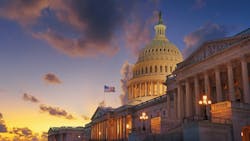NAHB Policy Briefing: How the Election Will Shape Housing Policy
This article first appeared in the November/December 2024 issue of Pro Builder.
The 2024 elections are in the books, with Republicans enjoying a sweep of the White House and both chambers of Congress.
Far more than in past elections, housing was on voters’ minds this election cycle. And while the availability and price of housing may not have shaped the outcome, it certainly drew more attention from candidates on both sides than it has in the past.
“Government regulations are responsible for more than 25% of the cost of a new single-family home and 40% of the cost of multifamily homes,” said President-elect Donald Trump. “We’re going to end all of that.” Now, with Republicans poised to control the White House, the Senate, and the House of Representatives, they have an opportunity to address the excessive regulations driving up the cost of housing.
RELATED
- NAHB's Plan to Promote Housing Affordability
- 2024 Election: Housing Takes Center Stage
- NAHB's Lake Coulson Weighs in on the Latest Housing Policy Initiatives
The National Association of Home Builders (NAHB) has taken a look at specific House and Senate committees to determine how new leadership may shape policies affecting production of new homes and apartments.
Tax Reform Redux
The legislative concern that will take center stage during President Trump’s first year in office is the fate of the tax policies enacted by the Tax Cuts and Jobs Act passed in 2017 during Trump’s first term in office.
Unless Congress acts to extend that law before it expires at the end of 2025, the nation faces over $4 trillion in tax increases starting on Jan. 1, 2026.
With Republicans retaining control of the House, Rep. Jason Smith (R-Mo.) will remain as chairman of the House Ways and Means Committee and Rep. Richard Neal (D-Mass.) will continue as the ranking member. As mandated by the Constitution, all tax laws must originate in the House. Smith has said he plans to work hand in hand with the president to extend key aspects of the 2017 tax measure.
On the Senate side, Sen. Mike Crapo (R-Idaho) will take over the gavel as chairman of the Senate Finance Committee. Crapo will have his leadership skills put to the test, as Congress seeks to avoid going over the “tax cliff.” Sen. Ron Wyden (D-Ore.), who has chaired the committee since 2021, will become the ranking Democrat on the committee.
Regulation in the Crosshairs
NAHB will continue to press the Senate Committee on Banking, Housing, and Urban Affairs, expected to be led by Sen. Tim Scott (R-S.C.), to use its jurisdiction to help promote policies that ease regulatory burdens and allow builders to increase the nation’s housing supply.
Additionally, with the National Flood Insurance Program (NFIP) still in need of long-term reauthorization, NAHB will work with the Senate Banking Committee chairman and his counterpart on the House Financial Services Committee to push through a multiyear reauthorization of the NFIP.
Sen. Shelley Moore Capito (R-W.Va.) will take the helm of the Senate Environment and Public Works Committee. Republican control benefits NAHB, as the association’s environmental policy goals align with the GOP members on the committee. Capito has been a staunch defender of private landowner rights and NAHB’s efforts on the Waters of the United States rule.
The future leadership of the House Committee on Energy and Commerce remains uncertain, especially with the retirement of current chair Cathy McMorris Rodgers (R-Wash.). Rep. Brett Guthrie (R-Ky.) is seen as a leading candidate for the gavel, though Rep. Bob Latta (R-Ohio) and Rep. Richard Hudson (R-N.C.) are also contenders. Rep. Frank Pallone (D-N.J.) is expected to continue as ranking member.
Regardless of who leads the committee, NAHB will work closely with its members to ensure energy policies support both housing affordability and local control of the code adoption process.
Leadership of the House Committee on Small Business is likely to stay the same with Rep. Roger Williams (R-Texas) keeping the gavel and Rep. Nydia Velázquez (D-N.Y.) continuing as ranking member. A Republican-led House panel is likely to focus on deregulation to help the nation’s small businesses.
In the Senate, Sen. Joni Ernst (R-Iowa) is expected to take the gavel of the Senate Com-mit-tee on Small Business and Entre-preneurship. As with its House counterpart, the committee under Republican control is likely to pursue deregulation that will create a more favorable climate for the nation’s small businesses.
Continuing Advocacy
Over the last year, NAHB has laid the ground-work to make housing a top priority at the local, state, and national levels.
This past spring, the association unveiled a 10-point housing plan that offers policymakers solutions to the headwinds thwarting production of more new housing. These headwinds include excessive regulations, inefficient local zoning rules, and building material supply-chain bottlenecks.

